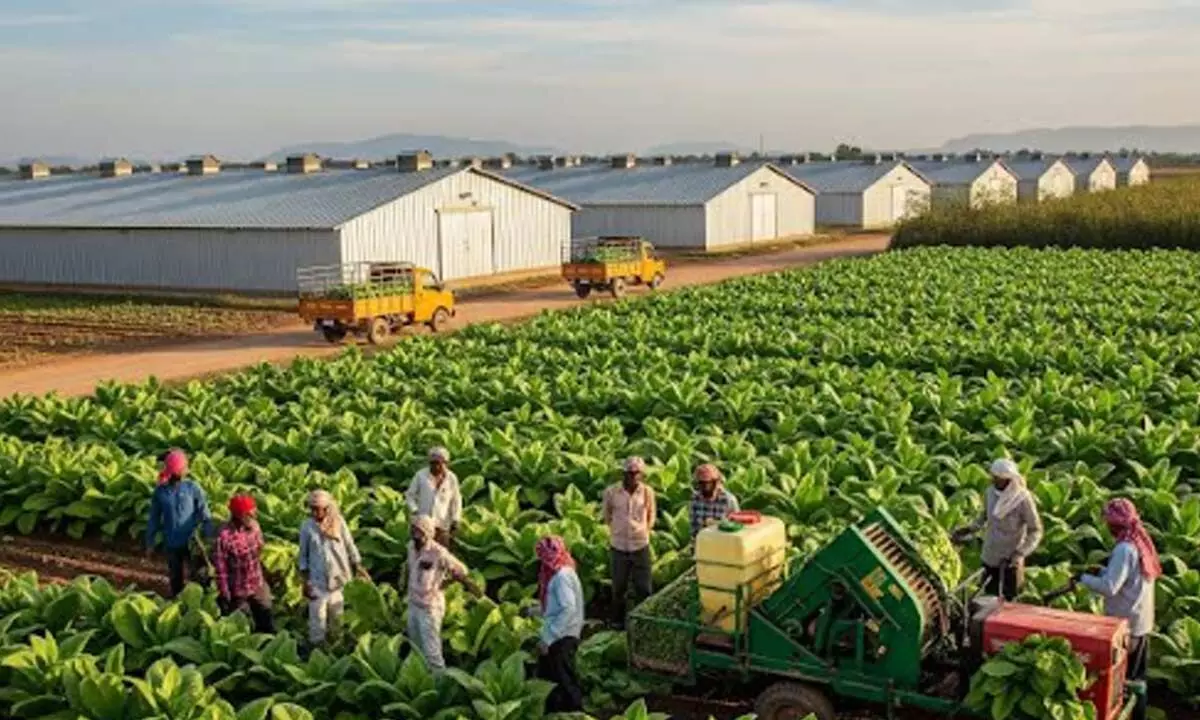728x90 - Google Ads
728x90 - Google Ads
336x280 - Google Ads
Foreign Investment Seen as Key to Modernising Andhra’s Tobacco Sector

336x280 - Google Ads
Rs 12,000-crore sector faces global market pressures; reforms and FDI seen as critical for long-term sustainability
300x600 - Google Ads
Andhra Pradesh’s tobacco belt is in distress, with HD Burley — once a prized variety — collapsing from ₹230 per kg to barely ₹110–₹120 this season. Farmers in Prakasam, Nellore, and Guntur are struggling to cover even their input costs. Without FDI, Andhra’s tobacco sector risks decline; with it, farmers could see a permanent income lift. This is not a temporary blip. It is a symptom of a deeper structural problem: the state’s tobacco economy has stalled.
Andhra Pradesh’s tobacco industry, one of India’s few agricultural export success stories, is valued at nearly ₹12,000 crore annually. This crisis has exposed the fragility of the system. Andhra continues to depend on quota management and incremental subsidies to stabilise farmer incomes. But these instruments are inadequate.
According to an exporter, M. Venkateswara Rao, ‘’Clearly, reforms in tobacco cultivation and marketing are urgently needed. Some companies are even allowed joint ventures, yet broader reforms remain stalled. When sensitive industries such as defense manufacturing have welcomed foreign direct investment, why has tobacco, an industry with major health implications and revenue potential, been excluded? Foreign companies willing to set up processing and product industries here are denied permissions. The so-called Open Industry Policy does not extend to tobacco.’’
He further added, ‘’Last year, Brazil’s crop yield dropped because of floods, while other producing countries also faced reduced cultivation. This year, however, yields have increased globally. Combined with reduced demand following the global impact of COVID-19, the market has slowed, with fewer investors and buyers. In the past, companies paid higher prices to secure supply and retain customers. In India, there is a stark difference between the purchase price paid to farmers and the selling price commanded by exporters. Burley tobacco, in particular, fetched high rates last year due to strong demand, leading farmers to expand cultivation this year. Unfortunately, with lower prices now, farmers are deeply disappointed.’’
Over the next five years, the sector will require an estimated ₹1,500–₹2,000 crore to modernise curing infrastructure, build traceability systems, secure sustainability certifications, and establish processing hubs. Without these reforms, up to 25% of Andhra’s FCV exports could be locked out of key markets within a decade, especially with sustainability regulations such as the EU’s Green Deal.
Other countries have shown what FDI can achieve. Brazil modernised its curing infrastructure and embraced global sustainability standards through international partnerships, enabling its farmers to consistently earn 15–20% more. The Philippines turned its declining sector around by welcoming FDI-backed joint ventures that delivered climate-resilient seeds, mechanisation, and digital farm management tools.
Andhra, in contrast, continues to export an undifferentiated commodity. FDI is not just money on the table. It is a package of capital, technology, sustainability expertise, and preferential buyer access. With the right safeguards, foreign partnerships could permanently raise farmer earnings by 20–25% while future-proofing Andhra’s role in global tobacco trade.

